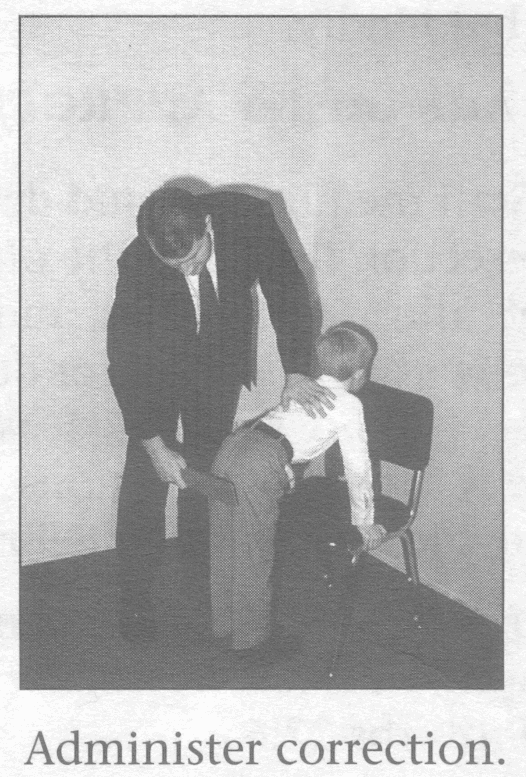
Beth sent me a link to this post the other day, and there’s also been a lot of talk about the football player who got in trouble for hitting his kid. I can’t say I’m totally decided on whether corporal punishment for kids is ever okay, but I think it’s definitely a matter of degree. Maybe for some children, lightly slapping them is something they’ll respond to better than other means of discipline. Still, it should be a last resort. And when you hit a child with a switch or whatever, that doesn’t reinforce that their behavior is bad so much as it does that they have a sadistic parent.

It gets even worse when I hear about fundamentalist Christians who think they should beat the ever-loving crap out of their kids, then comfort them. Yeah, that’s not going to give them a complex or anything. Apparently that kind of thing is common in BDSM relationships, and while I can’t say I understand that either, it’s between two consenting adults. It’s not the kind of bond you want to have with your child. According to this page, it’s apparently common among fundamentalists to claim that they have to hit their kids BECAUSE they love them. I don’t think that’s exactly what “tough love” is supposed to mean. I’ve even come across fundamentalists indicating that you should hit your kids with an object other than your hands. To quote this article, “Many, but not all, fundamentalist advocates of corporal punishment recommend striking children with implements rather than the hands so that the parents’ hands will be perceived as instruments of love.” Of course, it’s also likely that you’re going to hit a kid harder with a switch or cane than with your own hands. And, what, the kid isn’t going to see that you’re HOLDING that object in your loving hand?

The Biblical justification for beating children is mostly found in the book of Proverbs, most famously 13:24: “He that spareth his rod hateth his son: but he that loveth him chasteneth him betimes.” This was later reworked into “spare the rod, spoil the child,” one of those phrases that everyone knows but that often gets misinterpreted, sort of like “feed a cold, starve a fever.”

So being bad at math counts as mischief?
If you’re a believer in Biblical inerrancy, then I guess it doesn’t matter to you that this book was written over 2000 years ago, and there have been many advances in child psychology since then. This page points out that King Solomon, who is often identified as the author of Proverbs, was not presented as a very good father. In fact, the Bible is full of terrible parents. Abraham cast one son out into the desert and almost sacrificed another. Lot offered his daughters to a mob intent on rape, and they later somehow got it into their heads that it they should have sex with their dad. And these are the heroic patriarchs, not characters who are written as bad examples. So I’m not sure looking to the Good Book for child-rearing tips is necessarily the best idea. Perhaps more importantly as far as fundamentalism and corporal punishment go, it seems to reflect the way some of these people look at God. After all, he’s the All-Father (okay, that’s actually Odin, but you get the point), and supposedly loves all of us. And I’ve seen all kinds of stuff about how God punishes people BECAUSE he loves them, although exactly what anyone learns from an eternity of torment is unclear.

And just like God is always right (even when he breaks his own rules) and mankind is inherently sinful, children are naturally bad and have to be driven into submission by their parents. I’m not saying some kids aren’t bad, even when their parents seem to do everything right. But to have the unflappable “I’m right, you’re wrong, and you need to accept that” mentality means that you’re not going to learn from your own mistakes. And who among us can say that we’re perfect parents?
Speaking of punishment and behavioral conditioning, I recently read online that cats can be motivated by reward, but they don’t understand punishment. Did a cat write that? They can be pretty manipulative, after all.

You should see how sad Reagan’s eyes look when she’s begging for treats. I do think there’s a definite point there, though, in that the animal has to connect the reprimand with the bad behavior. If you punish them afterwards, they’re just going to think you’re mean for no reason. We have a spray bottle to use on the cats when they’re fighting or scratching something inappropriate, but the problem is we can never catch them at it.


As always, Nathan, you raise great talking points, and in this case the ease with which non-native language speakers misinterpret texts that are thousands of years old and which were understood differently in their time.
The issue here isn’t the biblical text, which as you’ll see conforms to modern psychology, but poor translations and those who only see literal meanings in poor translations.
I found this great excerpt from Michael Jost, M.Div., LMSW that I think does a great job illuminating what Proverbs actually said in Hebrew:
“Assumptions are very dangerous in human relationships. They allow us to carry the same mistakes from generation to generation. They fool us into thinking that we truly know something, when in reality, we don’t know it at all.
The statement, “Spare the rod — Spoil the child” is one that most people assume deals with corporal punishment. It is not about beating!
This saying comes from a Proverb which reads, “Those who spare the rod (shebet) hate their children, but those who love them are diligent to discipline them.” (Proverbs 13:24, NRSV1). The Hebrew word here is “shebet” that can be translated scepter or staff. If a rod for beating was meant here, the more direct term of “muwcar” would have made the meaning clearer.
So, what is this “shebet”? As noted above it can mean a scepter or a staff as in a shepherd’s staff. It is a sign of authority and a tool to shepherd the sheep. According to Easton’s Bible Dictionary, “the scepter originated in the idea that the ruler was a shepherd of his people.
What does being a shepherd entail? The earliest meaning in the Bible is that a shepherd is one who cares for his/her sheep: “But made his own people to go forth like sheep, and guided them in the wilderness like a flock. And he led them on safely, so that they feared not…” (Psalm 78:52-53) As parents we are to guide our children in the wilderness of the modern world. We need to provide them with a set of values and with ways of approaching life that has integrity and respect for others as a cornerstone. We certainly don’t do that by beating them. A shepherd who beats his/her sheep, will have no flock. The sheep will run from his/her voice and flee from his/her calling.
But what about the second part of the Proverb? That phrase about “discipline” can be also misunderstood. For some people, the only concept of discipline which comes to mind is vengeful and punishing. Its sole purpose is to break a child’s spirit. This kind of parent confuses the fear that their children have of them with respect which they think they deserve. What they do not understand is that fear drives out respect. Respect is earned through loving interaction, not with beatings.
So what does “discipline” mean? One only needs to look at the beginning of the Book of Proverbs to find the definition: “For learning about wisdom and instruction, for understanding words of insight, for gaining instruction in wise dealing, righteousness, justice, and equity…” (Proverbs 1:2-3). The Hebrew word used for discipline in the proverb is used here for instruction. Discipline has to do with teaching, not beating.
We parents are the shepherds for our children. By applying the rod of protection, guidance, care, and nurturance, we can guide them into adulthood. But if we spare the rod, children are abandoned to their own devices and limited experiences for guidance.
Discipline is about instruction, not beatings. A child cannot listen to someone he/she is afraid of. Lessons cannot be integrated by one who is in shock from having been struck. What they learn is distrust, fear, and violence.”